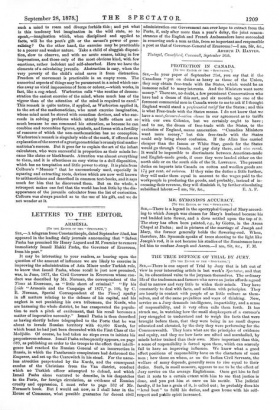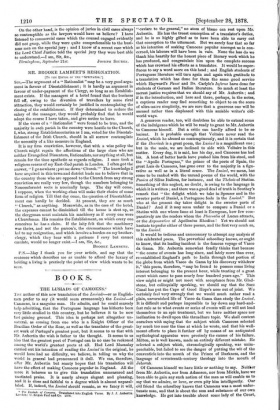THE TRUE DEFENCE OF TRIAL BY JURY.
[TO THE EDITOR OF THE "SPECTATOR."] SIR,—There is one aspect of Trial by Jury that is left out of view in your interesting article in last week's Spectator, and that is, its educational value to the jurymen themselves. The ordinary life of the tradesmen and farmers who serve on juries affords a good deal to narrow and very little to widen their minds. They have constantly to deal with facts, and seldom with principles. They are hourly in contact with people of as little culture as them- selves, and of the same prejudices and ways of thinking. Now, service on a Jury demands intelligence, impartiality, and a sense of responsibility, and it very often calls them forth. It has struck me, in watching how the small shopkeepers of a coroner's jury struggled to understand and to weigh the facts that were brought before them, that they were being in no small degree educated and elevated, by the duty they were performing for the Commonwealth. They learn what are the principles of evidence and equity, and they see how facts are sifted and marshalled, by minds better trained than their own. More important than this, a sense of responsibility is forced upon them, which can scarcely fail to have an improving influence. We know what a good effect positions of responsibility have on the characters of most men ; how those on whom, as on the Indian Civil Servants, the welfare of many depends, generally seem to rise equal to their duties. Such, in small measure, appears to me to be the effect of Jury service on the average Englishman. Once get him to feel that it rests to a certain extent with him to see th# justice is done, and you put him at once on his mettle. The judicial faculty, if he has a grain of it, is called out ; he probably does his "level best" to fulfil his duties, and goes home with his self- respect and public spirit increased.
On the other hand, is the opinion of juries in civil cases always so contemptible as the lawyers would have us believe? I have listened to commercial cases which the counsel engaged evidently did not grasp, while they were quite comprehensible to the busi- ness men on the special jury ; and I know of a recent case which the Lord Chief Justice told the special jury they were best able to understand.—I am, Sir, &c.,































 Previous page
Previous page